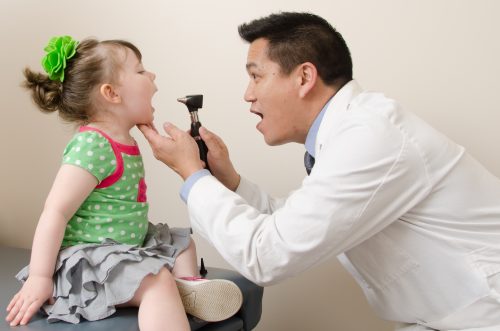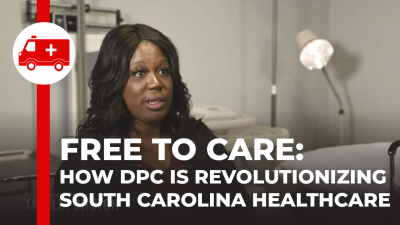Independent doctors, “old school medicine,” on the COVID-19 frontlines
Since the outbreak of novel coronavirus COVID-19, the most urgent public conversations have focused on healthcare preparedness—the availability of beds (particularly in ICU), equipment (especially respirators), and healthcare professionals (physicians and nurses).
That’s why much of the executive action at both at the federal and state level has focused on increasing capacity and easing restrictions on hospitals and medical providers. The McMaster Administration here in South Carolina acted boldly by Executive Order to waive certificate of need (CON) hospital bed limits placed on hospitals and to allow for broader use of telemedicine. This has already made healthcare more accessible in the Palmetto State during this unique emergency.
But there is a group of professionals in South Carolina healthcare that has been about maximum accessibility all along. This group of independent medical practitioners, many of them operating under the radar, are well–positioned to care for patients during a crisis like this.
Telemedicine
Dr. Shane Purcell of Direct Access MD in Anderson, South Carolina has a practice of 600 patients that are a part of his monthly “subscribers” for primary care services. In the last 2 weeks, he has been using virtual medicine to diagnose and track the progress of patients and to advise them on whether they should be tested for the novel coronavirus.
Because Direct Primary Care (DPC) practices operate on a program that has a fixed monthly cost for patients (as low as $50/month), Purcell’s patients aren’t being billed per visit. This “subscription” allows for frequent follow-ups and virtual visits without the dread of accumulating bills.
Additionally, because Direct Access MD is a cash-for-service practice and doesn’t accept insurance, patients do not have to get approval of telemed visits through their insurance provider. (Prior to the pandemic outbreak, many insurance providers didn’t cover telemedicine, but some, including Blue Cross Blue Shield, are adjusting in light of COVID-19.)
SC DHEC has also announced that there are now five South Carolina health systems that are offering free virtual (telehealth) COVID-19 screenings for those experiencing symptoms. Those health systems and info on how to get the free screening can be accessed here.
It’s important to note that those free COVID-19 virtual screenings are a unique offering. Prior to this epidemic, and excluding those providers listed by South Carolina’s Department of Health and Environmental Control (DHEC), most telehealth visits cost patients between $40 and $50.
Dr. Ted Swann owns a DPC practice in Clemson, SC. He told PPI that he’s been using telemedicine since his practice opened in 2012.
“Telehealth has been a part of our practice since the first day we opened 8 years ago,” Dr. Swann told PPI, “Because we are not billing for every service, it makes sense to meet patients where they are.”
He mentioned that because of their telehealth capabilities, they have been able to keep patients from coming into the clinic waiting room and risking their health or that of others.
“The bottom line is we have almost nobody coming to the office. We have been able to handle almost every need through the telephone or email.”
Dr. Swann says what makes the DPC telehealth experience unique is the relationship DPC physicians have with their patients.
“One of the hallmarks of our type of practice is the relationships we have with our patients. When you know your patients as well as we do, you can practice good medicine through telehealth.” Dr. Swann noted, “Telehealth with a relationship is very different than telehealth without a relationship.”
DPC practices are able to pair their innovation through telehealth with the “old-school” medicine of a true family doctor. That means a personal relationship with their doctor and access to care 24/7. This freedom has allowed DPC physicians to care for their patients well during the epidemic while others have struggled.
Another DPC clinic in South Carolina, Palmetto Proactive, is even treating tip-earning restaurant employees, those among the hardest hit by the pandemic, for free!
Testing
Dr. Swann told PPI that he’s had testing capability for over a week and has tested several patients for COVID-19 after ruling out the flu. As of Tuesday, none has returned positive.
Because Direct Primary Care practices are independent, they are able to work with a number of private labs for testing.
But it hasn’t been simple during the pandemic. Many DPC practices, even if they find a private lab for testing, report they have trouble actually administering the test. The suppliers of masks, gowns, and other equipment are out of stock. Dr. Swann said that he’s had to scrounge for equipment he already had in order to protect himself and others while administering the test.
Regardless, because Direct Primary Care practices are relatively small and local, they are able to direct patients to the nearest testing center. Dr. Purcell in Anderson noted that he is able to have repeated contact with patients, whether on a video call or telephone, and that has been very helpful for patients who are ill. This allows Dr. Purcell and other DPC doctors to provide unique and personal consultation on if they should get tested, as well as where and when.
Final thoughts
It is often said that a crisis tends to bring out the best and worst in people. That also applies to institutions—businesses, industries, government, etc. It’s clear, based on the many restrictions waived, that giving medical providers freedom to care for patients without the involvement of government or third-parties empowers doctors to do what we expect them to do—care for their patients well. There is no better example of that than in South Carolina’s DPC practices.
Palmetto Promise has been writing about the benefits of Direct Primary Care for years, and we recently visited some of the practices mentioned in this piece to produce a short film entitled Free to Care.
In this video, we tell the DPC story from the doctors’ and patients’ perspective. You can watch that here.






